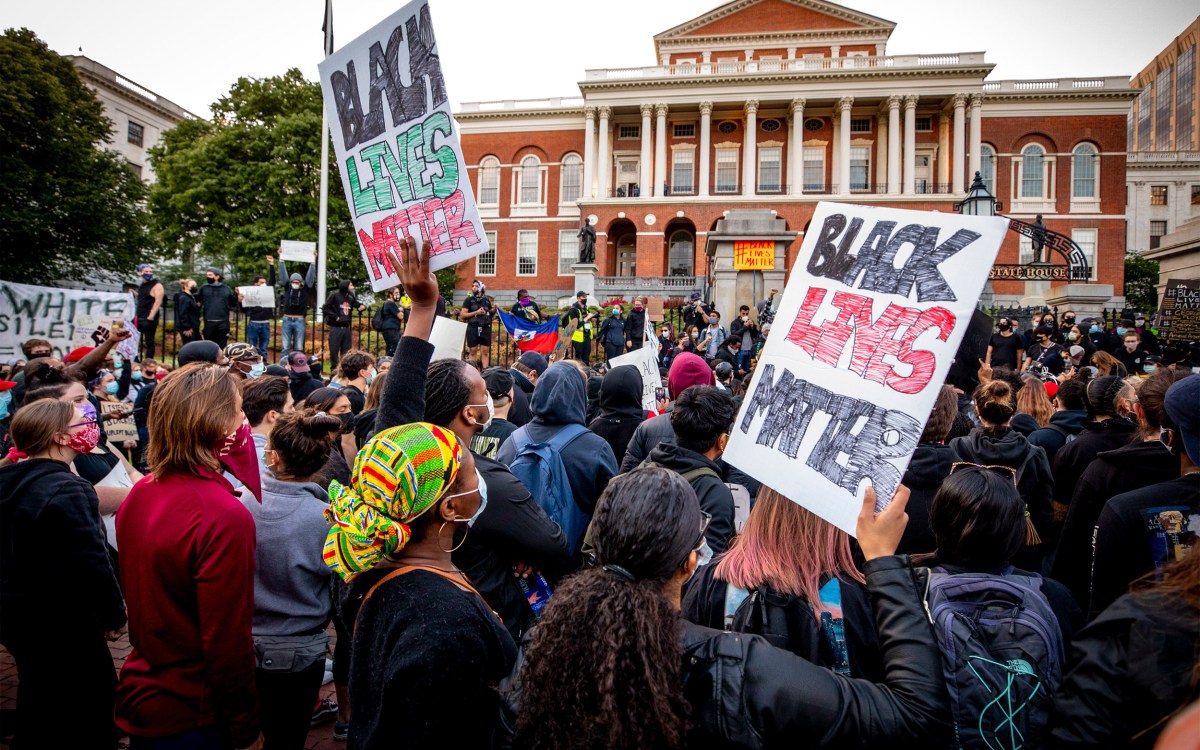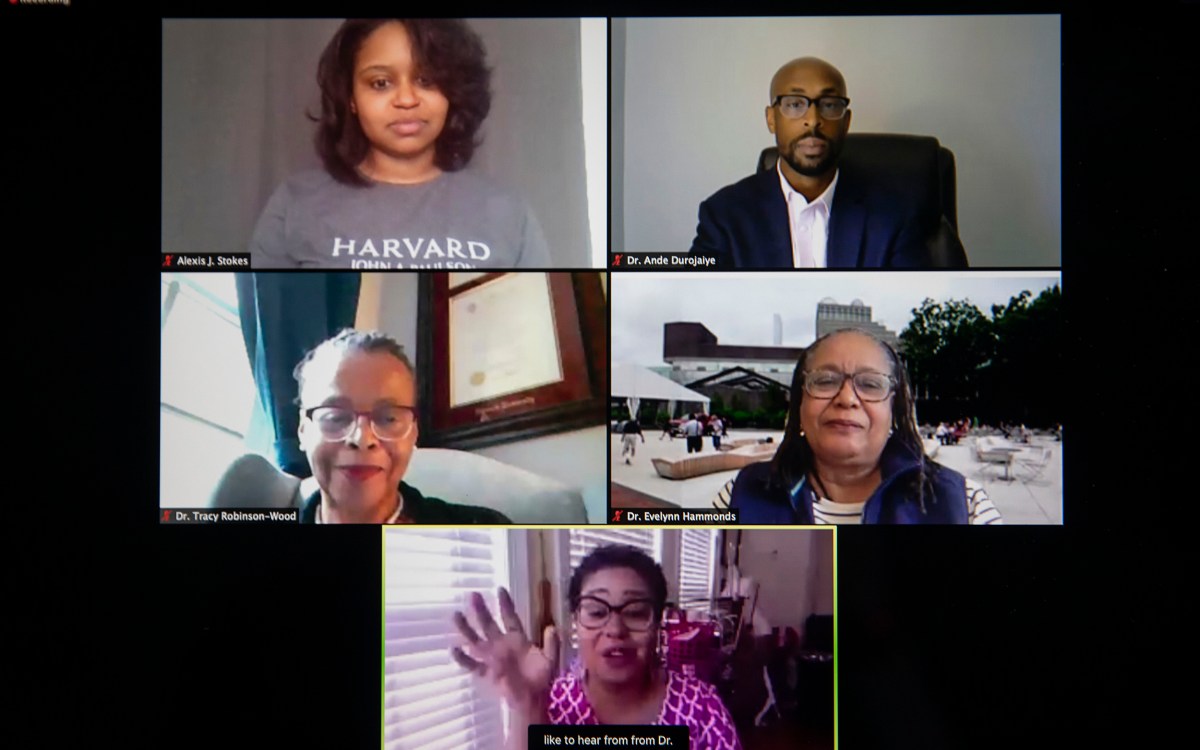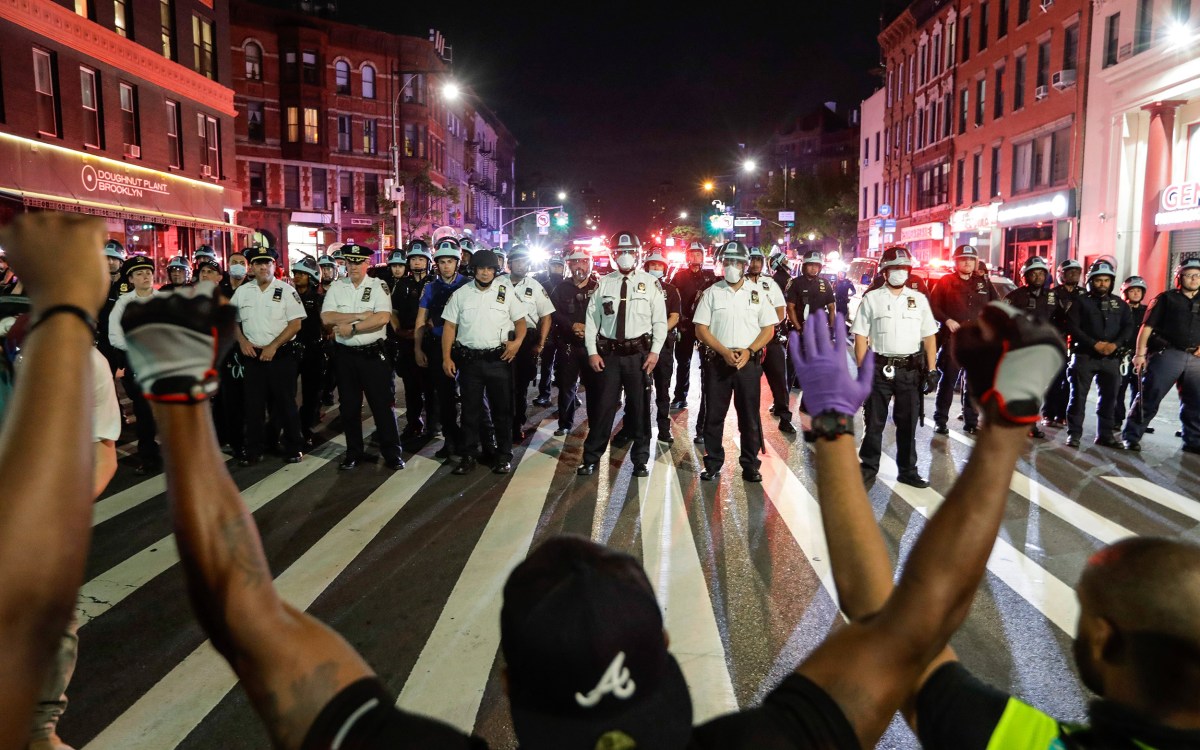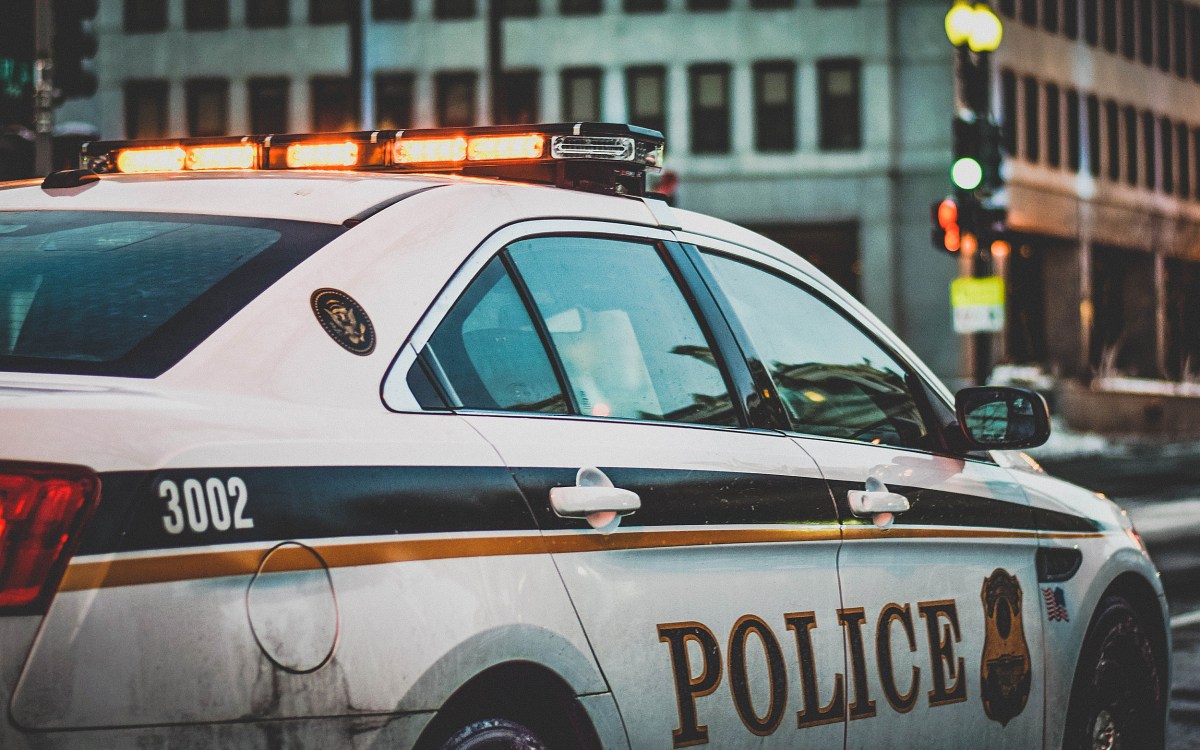
People rally outside the courthouse in Minneapolis on Tuesday, after the guilty verdicts were announced in the trial of former Minneapolis police officer Derek Chauvin in the death of George Floyd.
AP Photo/Morry Gash
Ensuring the Floyd trial becomes a turning point
Kennedy School professor talks about steps needed for meaningful police reform
The conviction Tuesday of former Minnesota police officer Derek Chauvin in the murder of George Floyd represents a rarity in the criminal justice system. Prosecutors seldom bring charges against police for any actions they take on duty because of what’s known as qualified immunity. Officers kill an average of about 1,000 people each year, with a disproportionate number of them being Black. In fact, African Americans are slain at a rate twice that of whites, according to a Washington Post database.
Captured by an eyewitness on a cellphone camera, Floyd’s grisly death last May sparked international outrage and reignited Black Lives Matter demonstrations over the historically unjust treatment of Black people at the hands of police.
Cornell William Brooks, Hauser Professor of the Practice of Nonprofit Organizations at Harvard Kennedy School, director of the William Monroe Trotter Collaborative for Social Justice at the School’s Center for Public Leadership, and visiting professor of the Practice of Prophetic Religion and Public Leadership at Harvard Divinity School. A civil rights attorney, Brooks served as president of the National Association for the Advancement of Colored People (NAACP) from 2014 to 2017. He spoke with the Gazette right after the trial about the significance of the Floyd verdict and what it may mean for the future of meaningful police reforms.
Q&A
Cornell William Brooks
GAZETTE: How did you feel hearing that a jury found Officer Chauvin guilty on all three counts?
BROOKS: I feel a sense of relief and a sense of resolve. By relief, what I mean, and what I believe many Americans mean, is not relief from violence avoided in the streets, but relief at [seeing] accountability in the courts, relief that a police officer has been held accountable. After Jamar Clark was killed, after Philando Castile was killed, there wasn’t any sense of accountability. Here, the fact that you had a police chief, a trainer of police, cross the wide, blue line [to denounce Chauvin’s actions at trial] suggests that the blue wall of silence is crumbling and cracking.
That speaks to the fact that there’s a tectonic shift in the American public. We had President Joe Biden, author of the [1994] crime bill, end a presidential address with not “God bless you and God bless America,” but “God bless you and God bless the Floyd family.” The fact that Joe Biden, standing beside the former California State Attorney General Kamala Harris, now the vice president, spoke and stood on the side of people who have been brutalized by the police, profiled by the police, who feel, empirically and historically speaking, that they are objects of suspicion rather than subjects [deserving] of protection, is a noteworthy moment.
As we know from last summer, the community meetings and town halls at the Kennedy School, we were witnesses to 26 million Americans taking to the streets in the largest demonstrations in American history. And so, there’s a shift in sentiment, there is the beginning of a shift in policing. Think about this: In 1955, when Emmett Till was killed, it ignited and inspired the Civil Rights Movement without the guilty verdict. When George Floyd was killed, it did further ignite and inspire the Black Lives Matter movement — now, with the guilty verdict. So this is a very, very serious moment.
“This is a victory for prosecutors; it’s a victory for protesters. But it is by no means a commendation of American policing or the American judiciary,” said Cornell Brooks.
Jon Chase/Harvard file photo
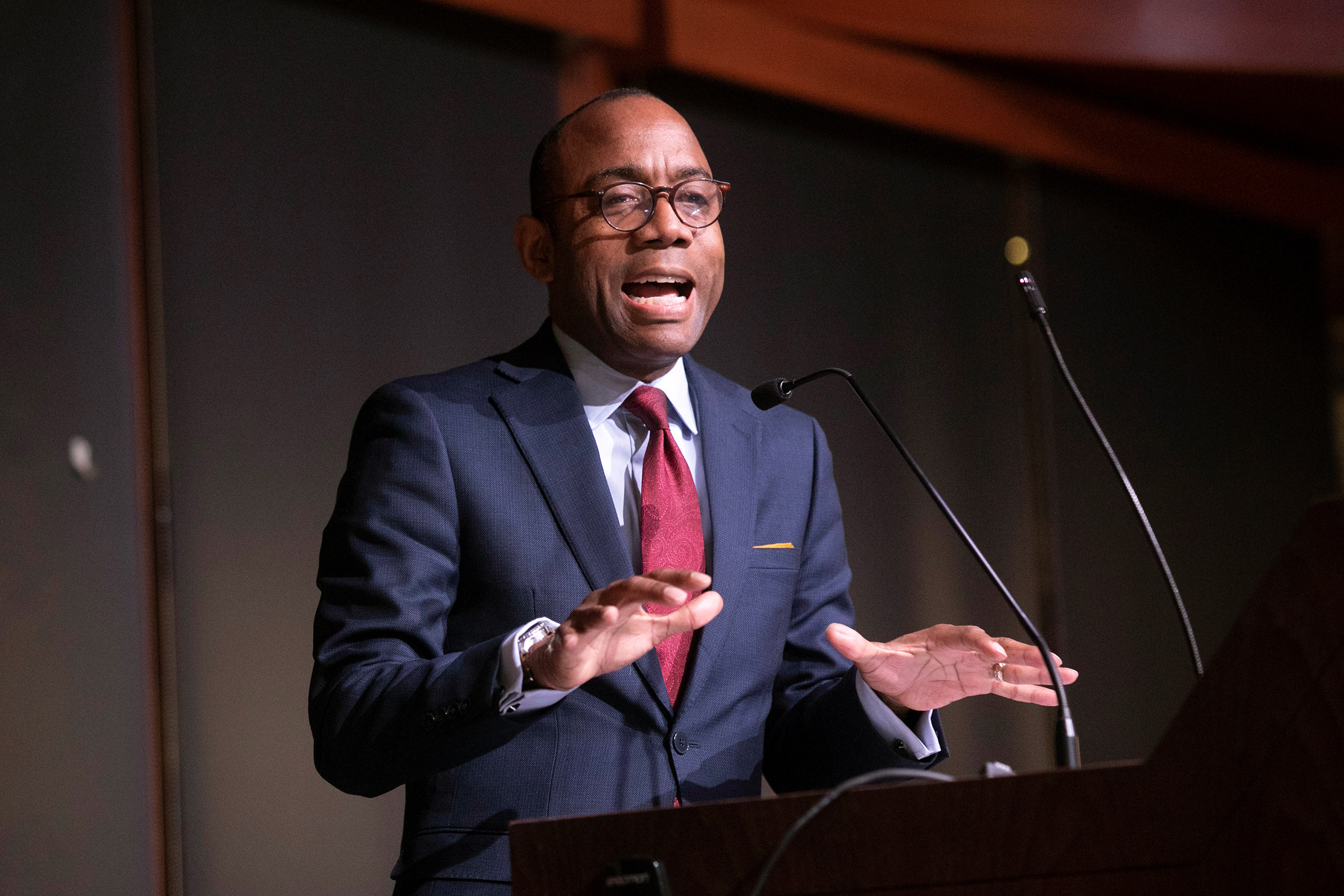
GAZETTE: Is it a victory or does the fact that so many people were unsure a jury would convict a police officer of murdering a Black person, even when it was captured on camera, even when it was supported by a mountain of strong evidence and the testimony of other police, suggest a defeat of sorts?
BROOKS: This is a victory for prosecutors; it’s a victory for protesters. But it is by no means a commendation of American policing or the American judiciary. If we think about Philando Castile being shot beside his friend and in front of his daughter, if we think about Sandra Bland, if we think about Laquan McDonald, when we think about so many hashtagged human beings who are lying in graves of tragedy with zero accountability, this is by no means a congratulatory moment or a moment of commendation for either the judiciary or policing. It is a moment of challenge, and it’s a moment of resolve. We had jurors speak in Minneapolis, holding Derek Chauvin accountable for George Floyd’s death. We wait for Congress, in terms of passing the George Floyd Act so that we prevent the further hashtagging of human beings in this country at the bloody hands of police brutality.
GAZETTE: Is the conviction likely to fundamentally change anything about policing, the way police excessive-force cases are prosecuted, or the skepticism that many Black people and others feel about society’s willingness to hold police accountable for wrongdoing?
BROOKS: Can it fundamentally change policing? Yes, but that depends on us. Change in policing, the transformation of American policing, will not roll in on the wheels of inevitability. We have to pass the George Floyd Justice in Policing Act. We have to write legislation in state legislatures. We have to penetrate these bulletproof police contracts, and we have to rein in qualified immunity. There has been a potentially tectonic shift, but it really, really depends on us.
What does that mean at Harvard? What that means is we have students and professors and scholars and practitioners and staff who are charged with the responsibility of doing something about this.
The organization I led, the NAACP, came into being in 1909 as a consequence of the lynchings in the hometown of Abraham Lincoln — Springfield, Illinois. Legislation was introduced in the first part of the last century to end lynching. One hundred twelve years later, 200 attempts in Congress to pass federal anti-lynching legislation, still to no avail. So we did end the 20th-century form of lynching, but we have a new form of lynching. And that means students, faculty, staff, scholars, practitioners at Harvard have a responsibility. Why do I say this? Harvard, the Kennedy School in particular, had a lot to do with the proliferation, expansion, and development of community policing. That’s a good thing. Unfortunately, in some places, community policing morphed into stop and frisk, racial profiling, and some of the police brutality we see today. I lift this up to say that we are implicated in this. This is not about what “they” do. This is about the multiracial, multiethnic us. We are involved in this. This is our story. Harvard has a role to play. The Kennedy School has a role to play.
More like this
GAZETTE: Did you see or hear anything in this incident, in this trial, that makes you at all hopeful?
BROOKS: Oh, absolutely. What makes me hopeful is when I have students who live in Minneapolis working on these policing issues in my classes. When we have students designing projects, working with mayors, to address these issues. When I see people all across the country going out into the streets in the middle of a pandemic. The reason I’m hopeful is not because of the innate goodness of American police departments. The reason I’m hopeful is because of the demonstrated determination of American citizens who have faced tear gas, faced rubber bullets, faced ridicule, faced batons at the hands of the police, to face down this problem. Our confidence, our hopefulness, our sense of optimism is literally grounded in the demonstrated commitment and courage of people around us — who are not wearing badges, who are not in uniform, and who look like students, staff, faculty, and regular folks. That’s where my confidence lies, and that’s where my optimism lies.
GAZETTE: What are the lessons to be learned that can be applied to future prosecutions, to policing reform advocacy and legislation, to social justice movement strategies?
BROOKS: As somebody who teaches advocacy and who served as an advocate and a civil rights prosecutor, there are a couple of lessons. The first is, winning a case in court against the police begins in the streets. Chauvin might never have been charged, but for the multitude of people in the streets pressing the case. Number two: The media here is critically important in terms of shaping the narrative. Were it not for a young woman filming and transforming the George Floyd video into essentially the Emmett Till photograph of 1955, we would not even know about this case. So social media is important; traditional media is important; and Black media is important. We have to tell the story in the streets in order to get the story told in the courts. Number three: A sustained presence of protesters and demonstrators in the streets is critically important. Fourthly, it’s important that the movement engage the business community, the media, our elected representatives.
You need a youth-led, but multiracial, multiethnic, multisectoral coalition. We’ve seen artists, we have seen elected officials, we have seen people from the business community condemn this crime. It is critically important that you build broad coalitions in this movement. Young people are the disruptive technology in social movements. They provide energy, they provide a disruptive pace, that’s critically important here. The movement for Black Lives Matter began after Trayvon Martin, it picked up speed after Michael Brown, but really, it’s come to fruition in this moment, having a lot to do with younger people galvanizing and catalyzing this movement, acting as leavening in the bread. And frankly, having prosecutors who are willing to bring real cases. We saw after Michael Brown, prosecutors doing everything in their power to ensure that [former Ferguson, Mo., police officer] Darren Wilson was not charged. And we’ve seen this over and over again. In this case, we had prosecutors acting like real lawyers. [George Floyd] got what many people get every day, a group of lawyers determined to do their jobs and to do them vigorously.
Interview has been edited for clarity and length.



